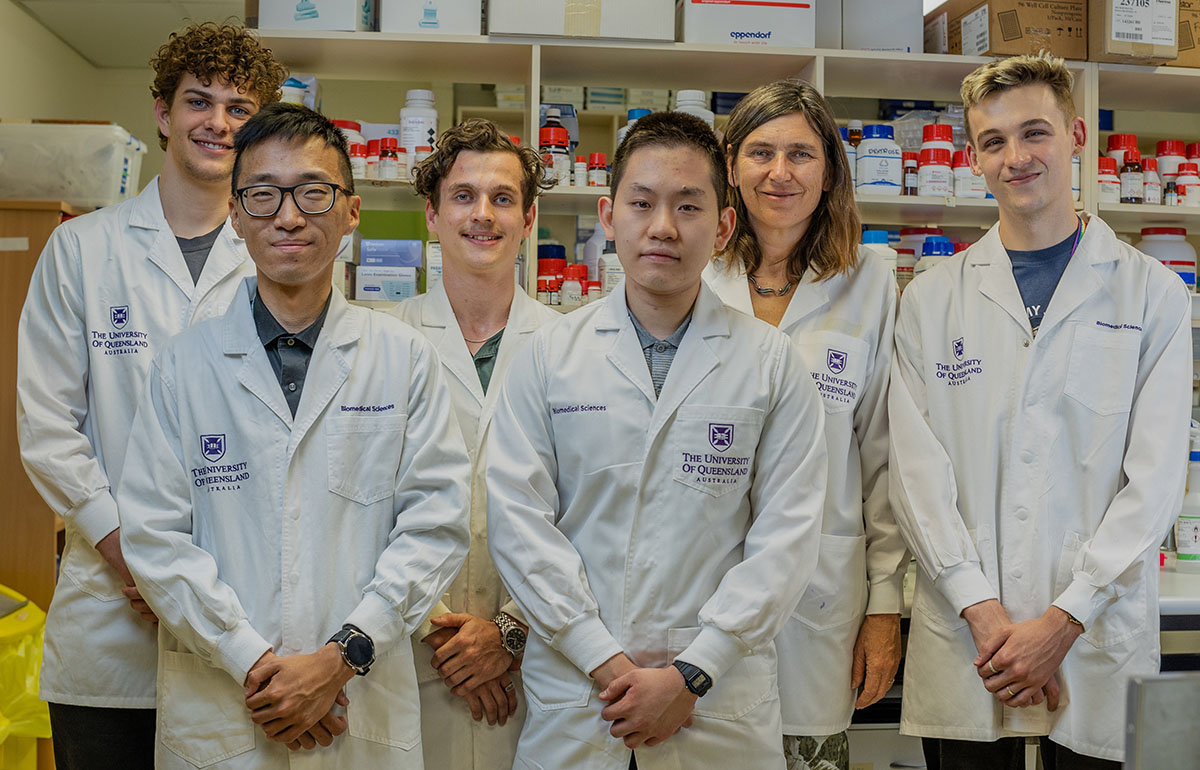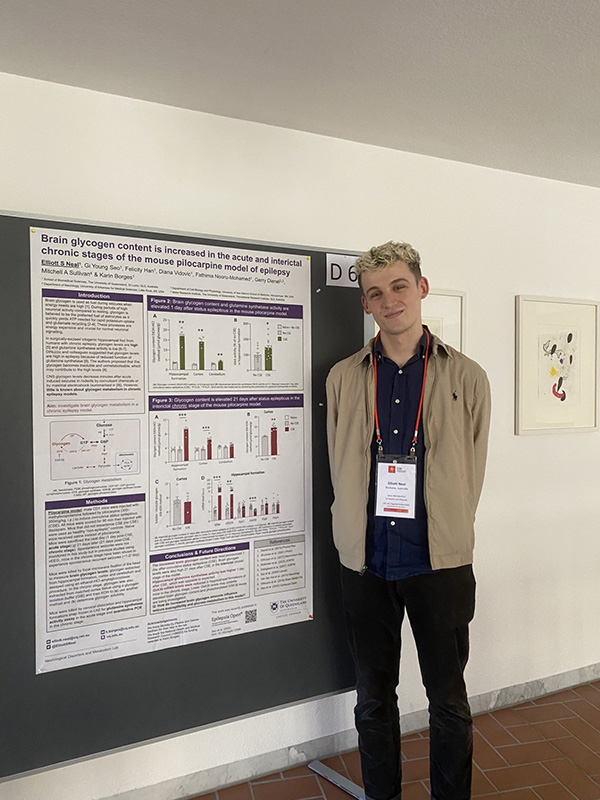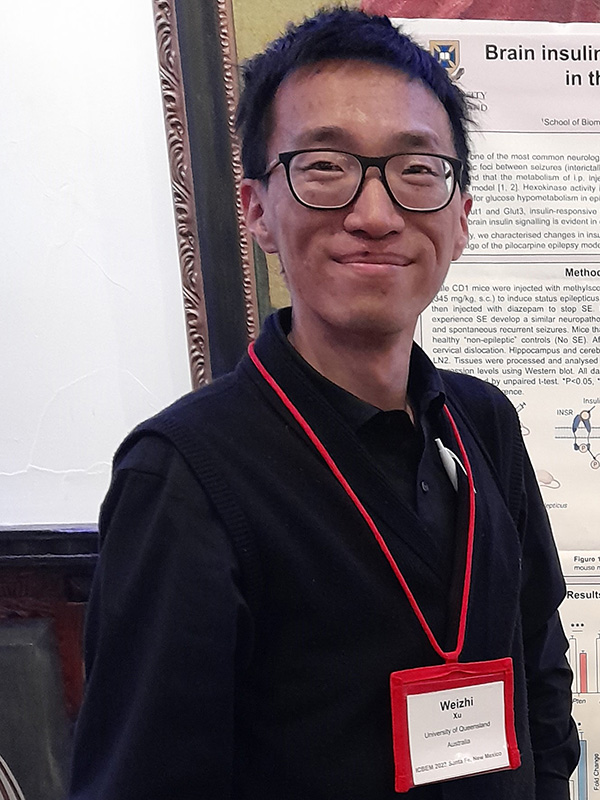
We are interested in morphological, biochemical and functional changes leading to seizures in epilepsy. The long-term goal is to find new and effective treatments for epilepsy that have few side effects. To this end, we are using preclinical models of epilepsy and have implemented clinical trials.
Glucose metabolism is often compromised in brain areas that generate seizures, which can lead to lack of energy. Most of the brain’s energy in neurons and astrocytes is needed for ion balancing and neurotransmission. Thus, lack of fuel can result in increases in extracellular potassium levels and impairments in glutamate handling, which can trigger abnormal excessive neuronal activity and seizure generation.
Our strategy is therefore to find a way to improve energy levels in the brain, with the aim to improve energy levels when glucose metabolism is insufficient.
We have focussed on medium chain triglycerides (MCTs), a type of fat that is sometimes added to medical ketogenic diets for the treatment of epilepsy. We have shown that different MCTs, when added to normal diets, can prevent seizure generation in seizure models. The body metabolises MCTs to two different auxiliary fuel types, namely ketone bodies and medium chain fatty acids. Both of these substances are taken up by the brain. Ketone bodies provide extra fuel to neurons, while medium chain fatty acids are metabolized by astrocytes. There is no competition for the metabolism of these substances, which render MCTs an ideal means to provide extra fuel to both brain cell types. Clinical trials (see Miscellaneous tab) have been initiated by our lab and others to test whether add-on MCT to a normal diet can be used to treat epilepsy.
Ongoing studies are investigating ways to improve glucose and glycogen metabolism.
A new aspect of our research is focusing on proteostasis and microglial metabolic reprogramming, which is led by Dr Liviu-Gabriel Bodea.
- Metabolic changes in epilepsy
- New approaches to improve glucose metabolism in epilepsy
For Honours and PhD projects please email Associate Professor Borges.
View full list of publications on eSpace
Neal, Elliott S. and Borges, Karin (2024).“Brain propane’’: Propionate Fuels the Brain in Mice With Brain Energy Deficits. Epilepsy Currents. doi: 10.1177/15357597241293843
Bodea, Liviu-Gabriel and Borges, Karin (2024).DREADD Microglia? Targeted Microglial Gi Activation in the Acute Phase can Reduce Seizure Severity, but is Detrimental in the Long Term. Epilepsy Currents, 24 (6), 420-422. doi: 10.1177/15357597241279761
Xu, Weizhi and Borges, Karin (2024).Case for supporting astrocyte energetics in glucose transporter 1 deficiency syndrome. Epilepsia, 65 (8), 2213-2226. doi: 10.1111/epi.18013
Armstrong, Oliver J., Neal, Elliott S., Vidovic, Diana, Xu, Weizhi and Borges, Karin (2024).Transient anticonvulsant effects of time-restricted feeding in the 6-Hz mouse model. Epilepsy & Behavior, 151 109618, 109618. doi: 10.1016/j.yebeh.2023.109618
Rae, Caroline D., Baur, Joseph A., Borges, Karin, Dienel, Gerald, Díaz‐García, Carlos Manlio, Douglass, Starlette R., Drew, Kelly, Duarte, João M. N., Duran, Jordi, Kann, Oliver, Kristian, Tibor, Lee‐Liu, Dasfne, Lindquist, Britta E., McNay, Ewan C., Robinson, Michael B., Rothman, Douglas L., Rowlands, Benjamin D., Ryan, Timothy A., Scafidi, Joseph, Scafidi, Susanna, Shuttleworth, C. William, Swanson, Raymond A., Uruk, Gökhan, Vardjan, Nina, Zorec, Robert and McKenna, Mary C. (2024).Brain energy metabolism: A roadmap for future research. Journal of Neurochemistry, 168 (5), 910-954. doi: 10.1111/jnc.16032
Dienel, Gerald A., Gillinder, Lisa, McGonigal, Aileen and Borges, Karin (2022). Potential new roles for glycogen in epilepsy. Epilepsia, 64 (1), 29-53. doi: 10.1111/epi.17412
Andersen, Jens V., Westi, Emil W., Neal, Elliott S., Aldana, Blanca I. and Borges, Karin (2022). β-hydroxybutyrate and medium-chain fatty acids are metabolized by different cell types in mouse cerebral cortex slices. Neurochemical Research, 48 (1), 1-8. doi: 10.1007/s11064-022-03726-6
Young Seo, Gi, Neal, Elliott S., Han, Felicity, Vidovic, Diana, Nooru‐Mohamed, Fathima, Dienel, Gerald A., Sullivan, Mitchell A. and Borges, Karin (2022). Brain glycogen content is increased in the acute and interictal chronic stages of the mouse pilocarpine model of epilepsy. Epilepsia Open, 7 (2), 361-367. doi: 10.1002/epi4.12599
Xu, Weizhi, Neal, Elliott S., Plan, Manuel and Borges, Karin (2022). Glyceryl triacetate feeding in mice increases plasma acetate levels but has no anticonvulsant effects in acute electrical seizure models. Epilepsy & Behavior, 137 (Pt A) 108964, 108964. doi: 10.1016/j.yebeh.2022.108964
Han, Felicity Y., Conboy‐Schmidt, Lisa, Rybachuk, Galena, Volk, Holger A., Zanghi, Brian, Pan, Yuanlong and Borges, Karin (2021). Dietary medium chain triglycerides for management of epilepsy: new data from human, dog, and rodent studies. Epilepsia, 62 (8) epi.16972, 1790-1806. doi: 10.1111/epi.16972
Borges, Karin, Kaul, Neha, Germaine, Jack, Carrasco-Pozo, Catalina, Kwan, Patrick and O'Brien, Terence J. (2020). Open label long term treatment of add-on triheptanoin in adults with drug-resistant epilepsy. Epilepsia Open, 5 (2), 230-239. doi: 10.1002/epi4.12391
McDonald, Tanya, Hodson, Mark P., Bederman, Ilya, Puchowicz, Michelle and Borges, Karin (2019). Triheptanoin alters [U- 13 C 6 ]-glucose incorporation into glycolytic intermediates and increases TCA cycling by normalizing the activities of pyruvate dehydrogenase and oxoglutarate dehydrogenase in a chronic epilepsy mouse model. Journal of Cerebral Blood Flow and Metabolism, 40 (3), 271678X19837380-691. doi: 10.1177/0271678X19837380
Borges, Karin, Kaul, Neha, Germaine, Jack, Kwan, Patrick and O'Brien, Terence J. (2019). Randomized trial of add-on triheptanoin vs medium chain triglycerides in adults with refractory epilepsy. Epilepsia Open, 4 (1), 153-163. doi: 10.1002/epi4.12308
McDonald, Tanya, Puchowicz, Michelle and Borges, Karin (2018). Impairments in oxidative glucose metabolism in epilepsy and metabolic treatments thereof. Frontiers in Cellular Neuroscience, 12 274, 274. doi: 10.3389/fncel.2018.00274
Calvert, Sophie, Barwick, Katie, Par, Melody, Ni Tan, Kah and Borges, Karin (2018). A pilot study of add-on oral triheptanoin treatment for children with medically refractory epilepsy. European Journal of Paediatric Neurology, 22 (6), 1074-1080. doi: 10.1016/j.ejpn.2018.07.014
Tefera, Tesfaye W. and Borges, Karin (2018). Neuronal glucose metabolism is impaired while astrocytic TCA cycling is unaffected at symptomatic stages in the hSOD1G93A mouse model of amyotrophic lateral sclerosis. Journal of Cerebral Blood Flow and Metabolism, 39 (9), 271678X18764775-1724. doi: 10.1177/0271678X18764775
Tan, Kah Ni, Simmons, David, Carrasco-Pozo, Catalina and Borges, Karin (2018). Triheptanoin protects against status epilepticus-induced hippocampal mitochondrial dysfunctions, oxidative stress and neuronal degeneration. Journal of Neurochemistry, 144 (4), 431-442. doi: 10.1111/jnc.14275
McDonald, Tanya S. and Borges, Karin (2017). Impaired hippocampal glucose metabolism during and after flurothyl-induced seizures in mice: Reduced phosphorylation coincides with reduced activity of pyruvate dehydrogenase. Epilepsia, 58 (7), 1172-1180. doi: 10.1111/epi.13796
Benson, Melissa J., Manzanero, Silvia and Borges, Karin (2017). The effects of C5aR1 on leukocyte infiltration following pilocarpine-induced status epilepticus. Epilepsia, 58 (4), e54-e58. doi: 10.1111/epi.13698
McDonald, Tanya S., Carrasco-Pozo, Catalina, Hodson, Mark P. and Borges, Karin (2017). Alterations in cytosolic and mitochondrial [U-13C] glucose metabolism in a chronic epilepsy mouse model. eNeuro, 4 (1) e0341-16.2017, ENEURO.0341-16.2017. doi: 10.1523/ENEURO.0341-16.2017
Tefera, Tesfaye W. and Borges, Karin (2017). Metabolic dysfunctions in amyotrophic lateral sclerosis pathogenesis and potential metabolic treatments. Frontiers in Neuroscience, 10 (JAN) 611, 461-473. doi: 10.3389/fnins.2016.00611
Tefera, Tesfaye W., Wong, Yide, Barkl-Luke, Mallory E., Ngo, Shyuan T., Thomas, Nicola K., McDonald, Tanya S. and Borges, Karin (2016). Triheptanoin protects motor neurons and delays the onset of motor symptoms in a mouse model of amyotrophic lateral sclerosis. Plos One, 11 (8) e0161816, e0161816. doi: 10.1371/journal.pone.0161816
Tan, Kah Ni, Carrasco-Pozo, Catalina, McDonald, Tanya S., Puchowicz, Michelle and Borges, Karin (2016). Tridecanoin is anticonvulsant, antioxidant, and improves mitochondrial function. Journal Of Cerebral Blood Flow and Metabolism, 37 (6), 2035-2048. doi: 10.1177/0271678X16659498
Benson, Melissa J., Manzanero, Silvia and Borges, Karin (2015). Complex alterations in microglial M1/M2 markers during the development of epilepsy in two mouse models. Epilepsia, 56 (6), 895-905. doi: 10.1111/epi.12960
Hadera, Mussie G., Smeland, Olav B., McDonald, Tanya S., Tan, Kah Ni, Sonnewald, Ursula and Borges, Karin (2014). Triheptanoin partially restores levels of tricarboxylic acid cycle intermediates in the mouse pilocarpine model of epileps. Journal of Neurochemistry, 129 (1), 107-119. doi: 10.1111/jnc.12610
McDonald, Tanya S., Tan, Kah Ni, Hodson, Mark P. and Borges, Karin (2014). Alterations of hippocampal glucose metabolism by even versus uneven medium chain triglycerides. Journal Of Cerebral Blood Flow and Metabolism, 34 (1), 153-160. doi: 10.1038/jcbfm.2013.184
Smeland, Olav B., Hadera, Mussie G., McDonald, Tanya S., Sonnewald, Ursula and Borges, Karin (2013). Brain mitochondrial metabolic dysfunction and glutamate level reduction in the pilocarpine model of temporal lobe epilepsy in mice. Journal of Cerebral Blood Flow and Metabolism, 33 (7), 1090-1097. doi: 10.1038/jcbfm.2013.54
Borges, Karin and Sonnewald, Ursula (2012). Triheptanoin - a medium chain triglyceride with odd chain fatty acids: a new anaplerotic anticonvulsant treatment?. Epilepsy Research, 100 (3), 239-244. doi: 10.1016/j.eplepsyres.2011.05.023
Nicola, Thomas K., Willis, Sarah, Sweetman, Lawrence and Borges, Karin (2012). Triheptanoin in acute mouse seizure models. Epilepsy Research, 99 (3), 312-317. doi: 10.1016/j.eplepsyres.2011.12.013
Samala, Ramakrishna, Klein, Jochen and Borges, Karin (2011). The ketogenic diet changes metabolite levels in hippocampal extracellular fluid. Neurochemistry International, 58 (1), 5-8. doi: 10.1016/j.neuint.2010.10.011
Willis, Sarah, Stoll, James, Sweetman, Lawrence and Borges, Karin (2010). Anticonvulsant effects of a triheptanoin diet in two mouse chronic seizure models. Neurobiology of Disease, 40 (3), 565-572. doi: 10.1016/j.nbd.2010.07.017
Find out more about our diverse range of research interests.
















